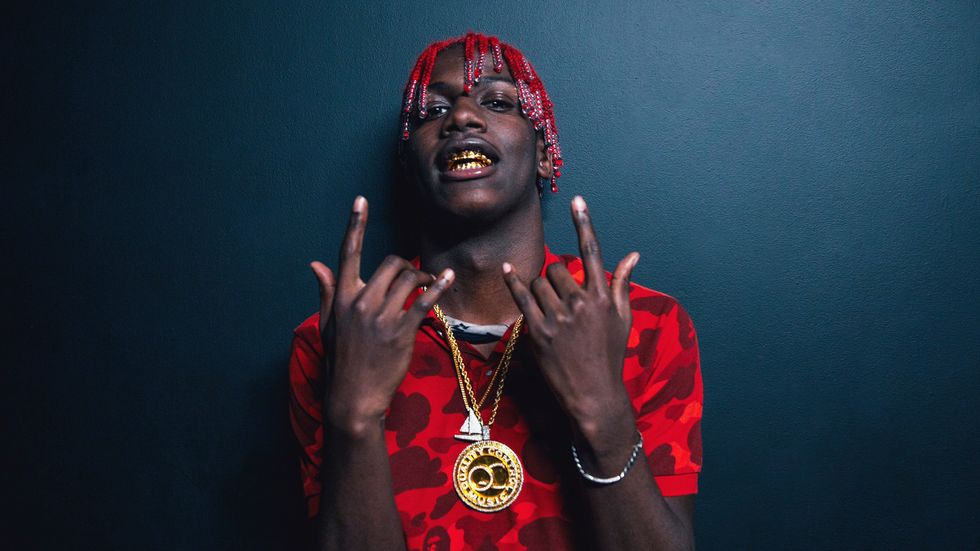This article has been a boundless joy and a challenge to write: “Peek a Boo,” a tour de force of unquestionable literary genius, weaves a complex fabric of ideological synthesis the likes of which haven’t been seen since, perhaps, Gilles Deleuze and Felix Guattari’s dankest of mixtapes, the hella dope Anti-Oedipus.I will admit that the chorus leaves a bit to be desired, but the verses…no words can adequately capture them. But I’ll try.
Lil’ Yachty, the mastermind behind “Peek a Boo,” begins his first verse with the deceptively simple lines, “Red dot, red dot, red dot, red dot, red dot/On his nose like Rudolph.” The clear evocation of communist ideology by the use of red nose imagery should go without saying. Thus begins a virtuosic flurry of subversive leftist shit:
He will, as he says, “Fuck her, then fuck on her sister,” expressing his support for nontraditional free-love movements. He continues, later on, “Take a step back then I bust it, I bust it, I bust it like Melo/Aimin’ at you and your fellows,” reassuring us that he’s just as progressive as we think—that his free-love stances are not limited to heteronormative structures, but, contrarily, that he may also aim at “fellows.”
But, highly aware that such non-heteronormative views run counter to hip-hop’s conventions, Yachty then further embraces the irrationality of love-relationships by saying, “She blow that dick like a cello,” an instrument which is generally not blown.
And so not only does he reject the heteronormativity and competitively monoamorous sexual traditions, but he also acknowledges that there may yet be substructures within the macrostructure of human sexuality that contradict what he may see as rationality, though those irrational substructures may yet be valid. Clearly this is a man with a self-awareness built upon extraordinarily open-minded humility.
But Mr. Yachty’s political commentaries don’t stop at sexuality. The end of his verse simply drips with Marxist overtones as he spits, “Vercetti frames, they be hidin’ my vision.” Thus, we see a man trapped in a bourgeois capitalist framework that he cannot escape, though he realizes that it hides his vision. But still he retains his populist goal: “Make sure all my niggas eat, that’s the mission/No more wishin’, I’m’a go get it, go get it, I got it.”
This is not an idealistic expression of Marxism the likes of which you might hear from your average Marxist on the street. Here is an artist who realizes the proactivity required, the zeal required, to initiate the revolution of the proletariat. But again we see him wrestle with the conflict between his communist vision and the hedonic pleasures of the capitalist milieu before him, as he leaves his talk of revolution to “play with that pussy like peek-a-boo, uh.”
Offset, one of the acclaimed Migos trio, sets a somewhat more esoteric tone in the second verse, extending some of Yachty’s ideological groundwork but also speaking powerfully to the fragmented nature of human perception.
Offset, as his pseudonym may suggest, somewhat counteracts Yachty’s communist vision by presenting an alternative path to the empowerment of the proletariat. “Open your eyes: bitch you see all this money/Made that lil’ bitch tape a brick to her stomach,” and so we have at once a scene of flabbergasting affluence but also the implication that this state has been achieved through participation in black markets. This view is further supported by the line, “You cappin’, I came from trappin'.”
But here Offset moves into a more postmodern narrative focused on life’s fragmentation in a way reminiscent of Deleuze and Guattari’s aforementioned dankness.
While it took Deleuze and Guattari around 300 pages to deconstruct Freud’s Oedipus, Offset removes himself in a single line from Oedipal triangulation, implying that his father was absent from his life and that his mother had no influence over him: “Mama couldn’t tell me shit, where was my daddy?” In one fell swoop, Offset has demolished, at least with regard to his own self-perception, the basis of much of psychoanalysis.
And so, freed from Oedipal shackles, Offset is free to conceptualize the world in terms of fragmentary flows and synecdoches: “I fucked that pussy the first time I met it,” he says, invoking Deleuze and Guattari’s image of the body without organs, the body as a surface upon which the movements of society inscribe their influences and for which organs only manifest themselves at the moment when they are called into use.
Lest he be viewed simply as a misogynist rather than as a post-psychoanalytic visionary, Offset applies the same sort of aggressive fragmentation to himself, spitting, “Married the money, the bitch wasn’t ready, uh, uh.” Simultaneously he paints himself as another inscribed body but one for whom money is an organ.
Capitalism, he implies, has co-opted his life and his definition to such a great extent that the woman he loves has “married the money” rather than him: The money smothers him but provides him with a sort of mollification-through-status that makes the violence of capitalism difficult to escape.
I may address the next verses in a subsequent article, but this song supplies the sort of depth that begs a careful reading and lots of time to marinate in the brain. And so for now, these ideas will suffice. There are, though, certainly some points that I’ve missed: The full brilliance of a work of this magnitude is tough to capture, particularly as I can only draw from my limited experiences. Please comment with your addendums or corrections to my analysis.



 Photo by
Photo by  Photo by
Photo by  Photo by
Photo by 


















